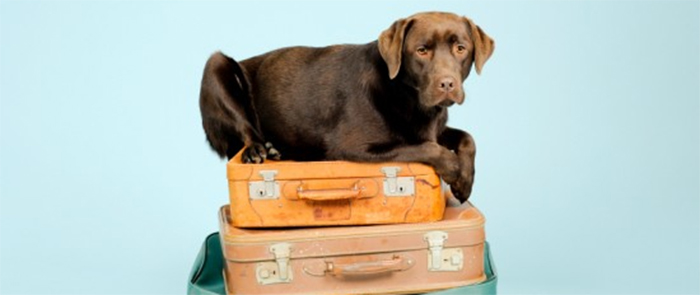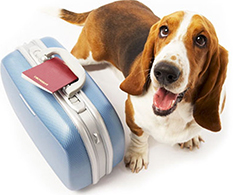
Going on vacation is the best, but leaving your pets behind can be the pits. It’s hard to relax and have a good time when you’re away from home and worried that your dog or cat is missing you, not eating properly, and—worst of all, the thought that they’ve run away to try to find you. (Does everybody else worry about that, or is it just me?)
I’ve boarded my dog, Ira (scruffy star of This American Dog), a few times when I’ve been in a pinch, but, for the most part, I’ve been lucky enough to have a circuit of friends that trade stay-at-home pet-sitting duties when one of us leaves town. I know boarding is the perfect solution for a lot of people, and there are some really stellar kennels that will take top-notch care of your furry family, but for me, I’ve always felt more at ease knowing that Ira is at home, on his own familiar turf.
Either way, whether you board or have a friend or neighbor take care of your pet, here are some helpful tips for pet care when you're away on vacation to ease your mind so that you can enjoy your vacation, and come back to a happy pet.
1. Make sure your dog or cat has updated pet ID tags. If, heaven forbid, your animal decides to make a break for it, you want to make sure they’re wearing your current phone number so that you can be reached in an emergency.
2. Activate Virtual Leash. Say you leave your phone charger at home, so you’re stuck with a dead phone on vacation, or you accidentally drop it into the ocean, or a pool, or, even more likely: a toilet. It happens all the time! With Virtual Leash, all of your pet’s vital information is kept on their online profile, which is printed on Dog Tag Art's personalized pet tags. With the click of a button, anyone who finds your pet can notify your emergency contacts via e-mail, Twitter, text message, and voicemail, and you can even update the best location for your pet to be returned, in case they’re staying away from home while you’re gone.
3. Detailed care instructions. Whether you board your pet or have someone come over to take care of them, you want to leave clear, detailed information so that there’s no confusion or guessing involved. Leave a note specifying exactly how much food your pet gets for every meal, including how many treats it’s okay to feed them. If they’re on some kind of medicine, leave instructions for how much they need to take, the best method to give it to them (ie. “Slather the pill in peanut butter”) and any other important information. It’s a good idea to have your home pet-sitter come over in advance of pet-sitting so that you can walk them through your routine, show them where everything is, and introduce them to your pet if they haven’t met already.
4. Important personal details. I once took care of a friend’s dog who tried to attack delivery trucks. They failed to mention that to me, and Rosie almost got away on our first walk when she lurched with all her might at a UPS van speeding down the road. Point out your pet’s lovable quirks so that your pet sitter knows what to expect, and how to keep your pet safe. Does your dog scrap with the dog across the street? How are they socialized with other animals? Do they show aggression when they’re on the leash? Have a problem with big or small dogs? Do they try to run after the mail carrier? Instinctively bolt after cats or squirrels outside? These are all important behaviors you’ll want to point out to your sitter.
5. Leave small comforts. Put an old t-shirt in your dog’s bed or crate so that they’ll be comforted by your scent. If your dog is going to be alone for stretches of the day by himself, leave a treat-dispensing toy, a Kong with peanut butter, or a pet-safe bone to keep them occupied. Make sure your sitter knows to refill the treats, too. You can ask your sitter to leave the radio on, or play some soft, soothing music during the day if your pet is used to noises of an active household.
6. Keep the goodbye short and sweet. Don’t make a production of your departure or you’ll leave your animal feeling anxious. Try to treat it like any other time you’re leaving the house, or dropping your pet off at the groomer’s or vet for a check up. It’s easier said then done, but if you can leave your animal in a relaxed a state as possible, it will serve you both well. In the end, it will probably be harder on you then your animal to say goodbye, but make it swift, and keep moving. You’ll have a sweet reunion to look forward to, and can show your excitement then.
| Good communication is key! Leave as much detailed information as possible for your sitter, as well as any phone numbers they’ll need—such as your cell and the phone number of where you’re staying, as well as any emergency numbers of your friends and family, and, of course, the phone number of your vet’s office—and your pet should be in good hands. These are just a few examples of ways you can ensure your pets are safe and satisfied while you are out of town. We would love to hear from you if you have any other good tips for pet care when you're away on vacation. |
|
| Kathleen McCafferty hates leaving her beloved scruffy terrier, Ira G, behind, but when she must, she follows these simple tips for pet care when you're away on vacation, to ensure her pooch is well looked after, and happy and healthy upon her return. She hopes this post helps other dog owners gain some peace of mind and that their pets are protected with custom dog tags from Dog Tag Art! |


